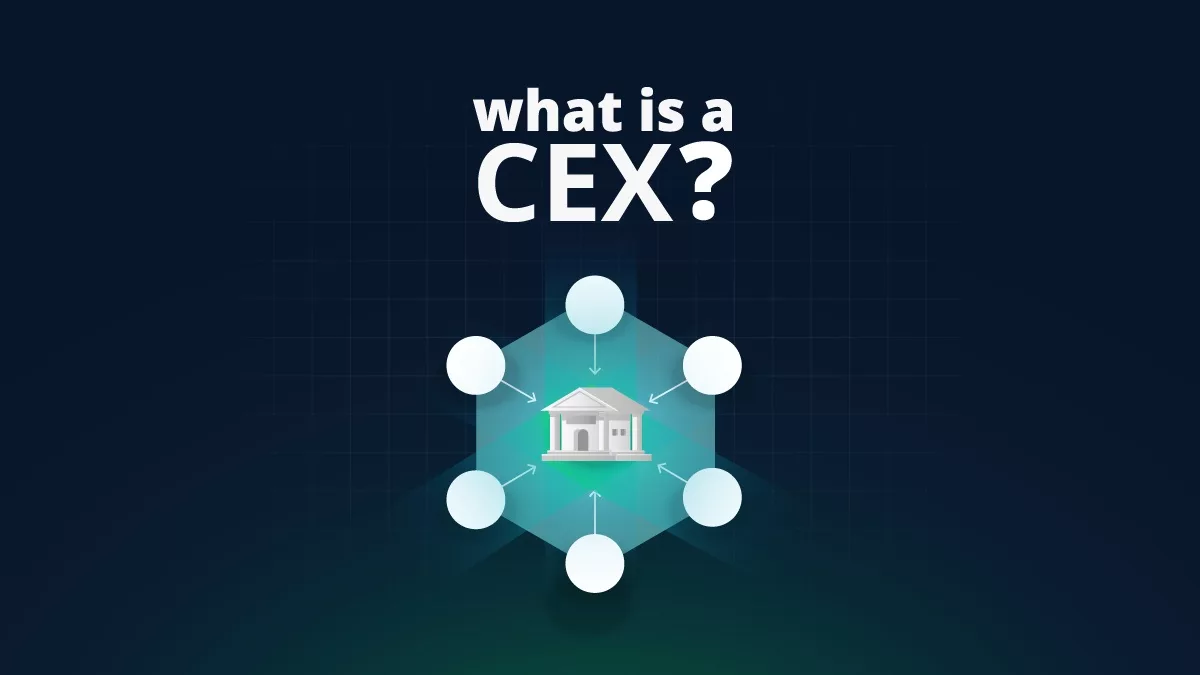In simple terms, a Centralized Exchange, or CEX, is like the headquarters of trading in the crypto world. It’s a platform where you can buy, sell, and trade various cryptocurrencies. Think of it as a big marketplace where you can find a variety of digital assets. Unlike decentralized exchanges, CEXs are run by a central authority, making them more like traditional stock exchanges. Users trust these platforms to facilitate their transactions securely.
A Centralized Exchange (CEX) is a central hub for buying and selling cryptocurrencies with a trusted central authority overseeing transactions.
This comprehensive guide offers insight into CEX trading platforms and answers the question, “What is CEX?” while giving beginners new to trading cryptocurrencies or those seeking in-depth knowledge a unique insight.
History of CEXs
Centralized Exchanges (CEXs) emerged in response to the growing demand for a platform to facilitate cryptocurrency trading efficiently. In the early years of cryptocurrencies like Bitcoin, there was a need for a centralized hub where users could easily buy and sell digital assets.
Platforms like Mt. Gox, established in 2010, played a pioneering role. However, these early exchanges faced security issues, with it famously experiencing a major hack in 2014.
Despite setbacks, newer CEXs like Coinbase and Binance entered the scene, learning from past mistakes and implementing robust security measures. Over time, CEXs became essential in making cryptocurrency trading more accessible to a broader audience, contributing to the overall growth of the crypto market.
In order to answer the question “What is CEX?”, it would be better to have a brief look at the history of its formation first. Now, let’s talk about how it works.
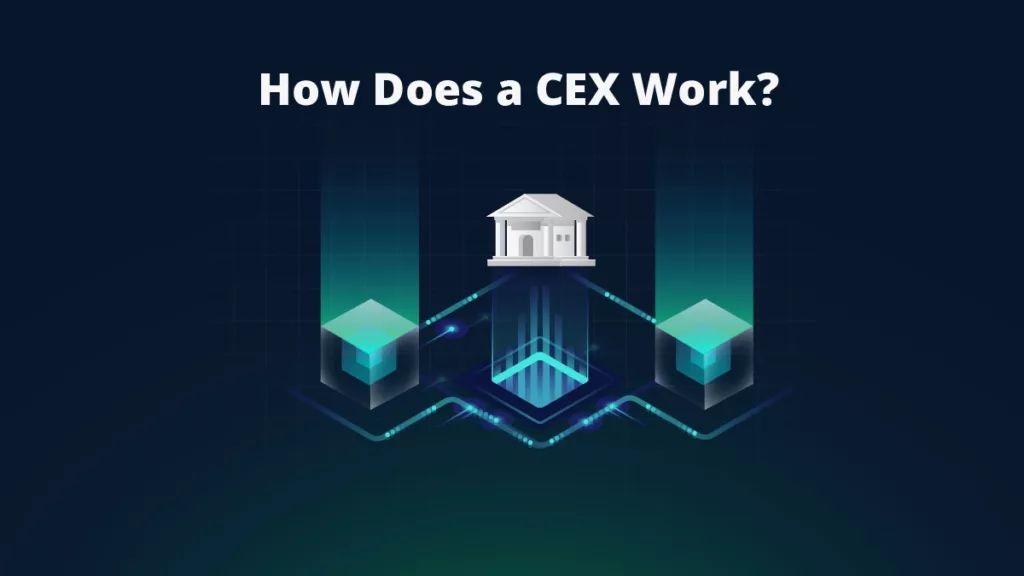
How Does a CEX Work?
Users place buy or sell orders on the CEX platform, specifying the desired quantity and price. The CEX then matches these orders, executing trades between buyers and sellers. It is important to mention that sometimes the deals are done quickly. This centralized model provides a streamlined and user-friendly environment for cryptocurrency trading, with the exchange managing the order book, order matching, and transaction settlement. Security measures are implemented to ensure the integrity and confidentiality of user data and assets, making CEXs a trusted avenue for participants in the crypto market. It’s good to mention that the transaction speed in CEXs is lower compared to a DEX because in CEXs, you need to wait for the intermediary’s approval.
Read more about the decentralized exchanges (DEX): What is DEX?
Several steps for using a Centralized Exchange
Account Creation
Begin by creating an account on the CEX platform. This typically involves providing necessary details, undergoing identity verification, and setting up security features like two-factor authentication.
Deposit Funds
Once the account is set up, deposit funds into your exchange wallet. This can often be done using various methods such as bank transfers, credit/debit cards, or other accepted payment methods.
Navigate the Platform
Familiarize yourself with the CEX platform. Most of them have an intuitive interface with sections for buying, selling, and managing your portfolio.
Placing Orders
When you’re ready to trade, you can place different types of orders. A “market order” is executed immediately at the current market price, while a “limit order” allows you to specify the price at which you want to buy or sell, waiting for the market to reach that point.
Monitoring Orders
Keep an eye on your open orders and transaction history. The platform provides real-time updates on your trades and account balance.
Withdrawal
If you wish to move your assets to an external wallet for added security, you can initiate a withdrawal. This involves specifying the amount and providing the destination wallet address.
Security Measures
It’s crucial to implement security measures such as two-factor authentication to enhance the safety of your account.
Stay Informed
Keep yourself informed about market trends, news, and any updates from the CEX. This knowledge can aid in making informed trading decisions.
Remember, each CEX may have slightly different processes, so it’s advisable to consult the platform’s documentation or customer support for specific guidelines.
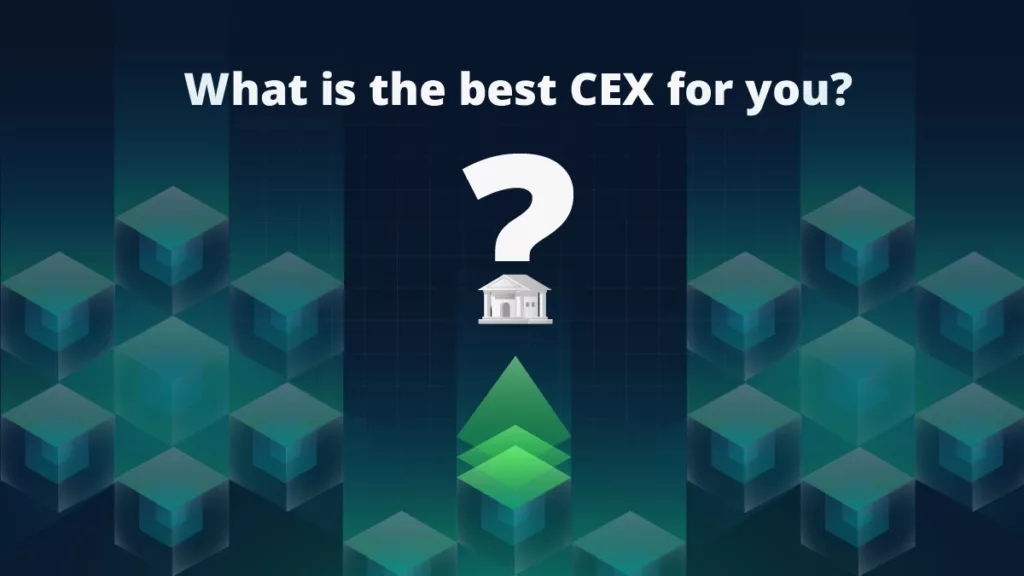
What is the best CEX for you?
Several factors should be carefully considered when selecting a Centralized Exchange to ensure a secure and user-friendly trading experience. Here are key items to keep in mind:
Security Measures
Look for exchanges with robust security protocols, including two-factor authentication (2FA) and encryption. Research the exchange’s history regarding past security incidents and how they handled them.
User Interface (UI) and Experience (UX)
Choose a platform with an intuitive and user-friendly interface, making navigating and executing trades easy. Ensure that the trading features are accessible and suit your level of expertise.
Supported Cryptocurrencies
Check if the exchange supports a wide range of cryptocurrencies or specific ones you are interested in trading.
Liquidity
Higher liquidity often results in better trade execution. Choose an exchange with a good trading volume for your preferred assets.
Fees and Costs
Understand the exchange’s fee structure, including trading, withdrawal, and other associated fees and costs. Some exchanges offer fee discounts or loyalty programs based on trading volume.
Payment Methods
Ensure that the exchange supports deposit and withdrawal methods that are convenient for you, such as bank transfers, credit/debit cards, or other payment options.
Regulatory Compliance
Verify that the exchange complies with relevant regulations in your area. This adds an extra layer of trust and legal protection.
Customer Support
Check the availability and responsiveness of customer support. A reliable support system can be crucial in case of issues or inquiries.
Reputation and Reviews
Research the exchange’s reputation by reading user reviews and testimonials. This can provide insights into the experiences of other traders.
Geographic Restrictions
Confirm whether there are any geographical restrictions imposed by the exchange, ensuring that you are eligible to use the platform in your location.
Additional Features
Some exchanges offer extra features like margin trading, staking, or lending. Consider if these features align with your trading strategy.
Upgrades and Innovation
Assess the exchange’s commitment to ongoing improvements, innovations, and adopting new technologies in the crypto space.
By carefully evaluating these factors, you can choose a CEX that aligns with your trading preferences and provides a secure and efficient trading environment.
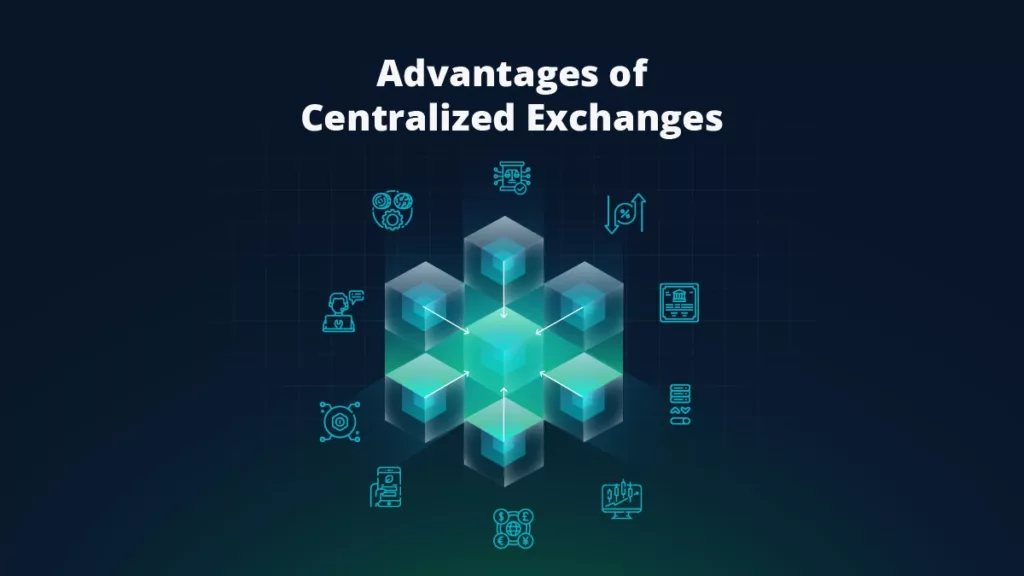
Advantages of Centralized Exchanges
User-Friendly Interface
CEXs typically provide intuitive and user-friendly interfaces, making it easy for beginners and experienced traders to navigate the platform.
High Liquidity
Centralized Exchanges often have high trading volumes, resulting in increased liquidity. This can lead to better price discovery and faster order execution.
Wide Range of Cryptocurrencies
Many CEXs offer a diverse range of cryptocurrencies for trading. Users can access various digital assets in one platform, enhancing convenience.
Fiat Onramps
Centralized Exchanges often support fiat-to-crypto trading, allowing users to buy cryptocurrencies directly with traditional currencies like USD, EUR, or others.
Advanced Trading Features
CEXs often provide advanced trading features such as margin trading, stop-loss orders, and limit orders, catering to the needs of professional traders.
Customer Support
Centralized Exchanges typically offer customer support services, allowing users to seek assistance in case of issues, inquiries, or technical difficulties.
Regulatory Compliance
Established CEXs tend to adhere to regulatory standards, providing users with a sense of security and ensuring compliance with legal requirements.
Efficient Price Discovery
With a large number of users and frequent trading activity, CEXs contribute to efficient price discovery, helping traders make informed decisions.
Quick Transactions
Transactions on CEXs are usually processed quickly, enabling users to execute trades and manage their portfolios efficiently.
Access to Additional Services
Some CEXs offer additional services like staking, lending, and other financial instruments, allowing users to diversify their crypto-related activities.
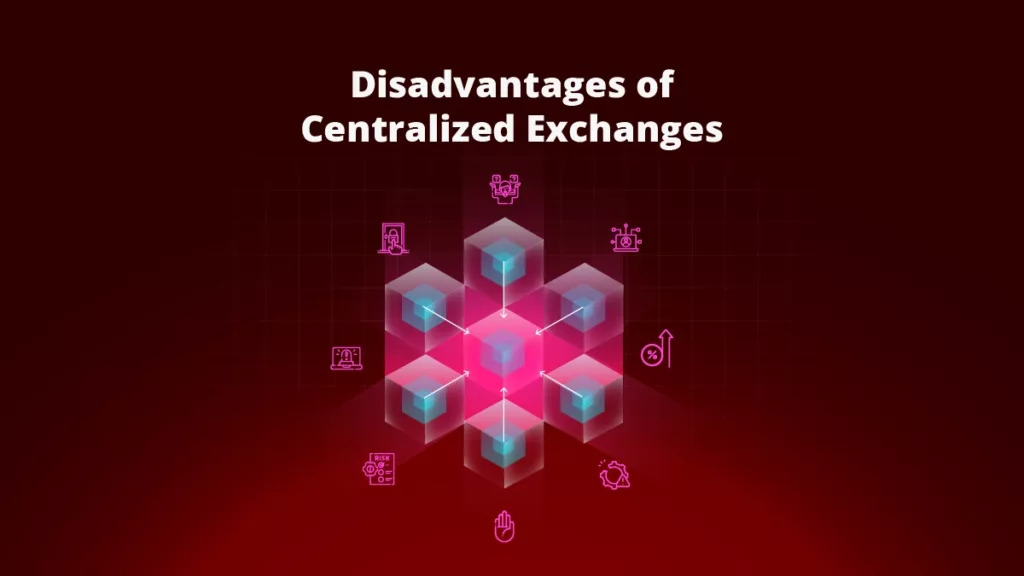
Disadvantages of Centralized Exchanges
Security Risks
CEXs are susceptible to security breaches and hacking attempts. In the past, some exchanges have experienced significant security incidents, leading to the loss of user funds.
Custodial Control
Users must entrust their funds to the exchange, which is a custodian. This centralized control goes against the decentralized nature of cryptocurrencies, and in the event of an exchange’s failure, users may face financial losses.
Limited Privacy
CEXs often require users to undergo identity verification processes, compromising user privacy. Personal information can be vulnerable to data breaches.
Regulatory Dependencies
Centralized Exchanges are subject to regulatory requirements, and regulation changes can impact their operations. Users may face restrictions or additional compliance procedures.
Potential Downtime
CEXs can experience technical issues or downtime, preventing users from executing trades or accessing their funds during crucial market movements.
Lack of Control
Users do not have direct control over their private keys when using CEXs. This lack of control contrasts with the principles of self-custody advocated in the cryptocurrency space.
Fees
Centralized Exchanges often charge fees for trading, withdrawals, and other services. These fees can accumulate, affecting the overall profitability of trading activities.
Limited Access
Some CEXs have geographic restrictions, limiting access to users from specific regions. This can be a barrier for individuals in areas with limited crypto infrastructure.
Single Point of Failure
CEXs are a risk in the cryptocurrency world. If something really bad happens to an exchange, it can cause problems for lots of users and the whole market.
Counterparty Risk
Users face counterparty risk when trading on CEXs, relying on the exchange to fulfill orders. Issues such as insolvency or mismanagement can result in financial losses.
Suggestion: Read more about the difference between centralized financial (CeFi) and decentralized financial (DeFi)
Trade Effortlessly
Ready to dive deeper? Our crypto exchange is simple and user-friendly, making trading a breeze
Wrap-Up
Centralized Cryptocurrency Exchanges are accessible hubs for individuals engaging in cryptocurrency trading. Answering the question “What is CEX?” and a deeper understanding of the foundational principles, inherent advantages, associated risks, criteria for selection, and effective trading strategies are instrumental in navigating the dynamic cryptocurrency market. Armed with this knowledge, individuals can enhance their chances of success when trading through these platforms. By conscientiously considering and applying the discussed strategies within the framework of CEX platforms, individuals have the opportunity to optimize their trading activities, elevate their likelihood of success, and enhance the overall quality of their trading endeavors.
FAQ
What is a Centralized Exchange or CEX in simple words?
A Centralized Exchange (CEX) is a central hub for buying and selling cryptocurrencies with a trusted central authority overseeing transactions.
What are the main steps for using a CEX?
Account Creation, Deposit Funds, Navigate the Platform, Place Orders, Monitor Orders, Withdrawal, Security Measures, and Stay Informed.
What are the benefits of a CEX?
User-friendly interface, High Liquidity, Wide Range of Cryptocurrencies, Fiat Onramps, Advanced Trading Features, Customer Support, Regulatory Compliance, Efficient Price Discovery, Quick Transactions, and Access to Additional Services.
What is a DEX in simple words?
A DEX is an online platform where users can directly trade cryptocurrencies with one another, eliminating the need for a central authority or intermediary. To learn more about them and their differences compared to CEXs, read this blog post: “What is DEX or Decentralized Exchange?”






